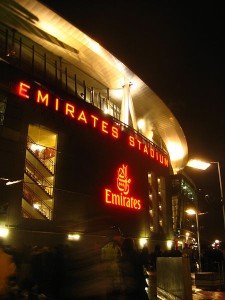Mona Sukkarieh.
On 11/07, the once-renowned British football club Nottingham Forest FC became the latest European club to be bought by wealthy businessmen from the Arab world. The club, which was acquired by the Kuwaiti al-Hasawi family, has dropped out of the Premier League in 1999 and struggled to avoid relegation in last season’s Championship.
Over the past years, Arab investments in European football have multiplied. Cautious at first, with the purchase of modest clubs, with modest ambitions (ex. Fulham, owned by Egyptian businessman Mohamed al-Fayed), Arab investments, by individuals usually linked to official institutions or Royal families, quickly took a bigger dimension and diversified to cover all sides of the world of football:
- Club acquisitions: In 2008, Abu Dhabi United Group for Development and Investment acquired Manchester City for around €230million. In 2010, Qatari investor Abdullah bin Nasser bin Abdullah Al Ahmed Al Thani bought Malaga CF for €36million. in 2011, the Dubai-based Royal Emirates Group bought Getafe CF for an amount said to be between €70million and €90million. Qatar Investment Authority acquired Paris Saint-Germain in two-steps in 2011 and 2012. Club acquisitions are directly followed by spectacular transfers and the arrival of high-profile players and technical staff.
- Sponsorships: The first coup was Emirates Airlines’ 15-year sponsorship of Arsenal for around €112million signed in 2004. The deal secured naming rights, with the company giving its name to Arsenal’s brand new stadium inaugurated in 2006 and “Fly Emirates” featured on the team’s shirt. The Qataris followed suit in 2010 with the Qatar Foundation reaching a €150million deal with FC Barcelona to add its name on the team’s shirt, breaking with its 111-year old policy of refusing corporate sponsorship. A year later, in 2011, Abu Dhabi strengthened its cooperation with Manchester City with a 10-year sponsorship deal with its flag-carrier Etihad Airways. The 10-year agreement, worth around €450million, includes shirt sponsorship and the renaming of City’s Stadium which became “Etihad Stadium”.
- Broadcasting rights: After establishing the most popular sport network in the Arab world, Al-Jazeera is taking on European football to expand its coverage. The Qatari channel entered the European television rights market in 2011 with an aggressive policy that started with purchasing a package of French Premier League (Ligue 1) matches from 2012 to 2016 for €90million a year, in a major blow to long-term rights holders Canal+. Al-Jazeera also acquired the rights to Champions League and Europa League matches between 2012 and 2015 as well as Euro 2012 and Euro 2016 in France and is now eyeing other European championships.

While club acquisitions usually target modest clubs or once-renowned clubs with ambitions to put them back on track and to restore their past glories on the medium term (Manchester City won the Premier League in 2012; PSG ranked 2nd in France in its first year after it was bought by the Qataris; Malaga ranked 4th in Spain), sponsorship campaigns are intended to be spectacular in nature, to shock and surprise the audience immediately on announcement. Beside cash returns, all three components have a more subtle long-term objective: to bolster image at home and abroad. Laden with cash piles, and, at times, desperate to put money to work, Gulf emirates have sought in the past few years to invest their money in high profile businesses with usually more than just cash returns in mind. Investing in football clubs, at the end of the day, follows the same logic as investing in Porsche or Daimler: Raising profiles and building prestige abroad while also contributing to creating social and economic benefits at home: Just like Porsche is setting up research & development and testing facilities in Doha, newly-acquired European football clubs will also contribute to local sporting and football development, whether through training camps or organizing friendly games with local teams.
Much more so than Emiratis whose interest seems to focus on the financial and economic aspects almost exclusively, Qatari investments seem to have the added-value of demonstrating genuine interest in sport. They are part of a broader strategy to strengthen the sporting culture in the small emirate, starting with the establishment of Aspire Academy in 2005 to identify and nurture sporting talents (distancing itself with its old policy of naturalizing foreign athletes) to the hosting of international competitions, the most prestigious of which, the Football World Cup, will be held in Qatar in 2022.
Whether in Qatar or in the UAE, sports, through investments at the national and international level, hosting of major international events and what follows from developing infrastructure, creating business opportunities and boosting tourism, is increasingly being considered as a credible element of economic diversification.
